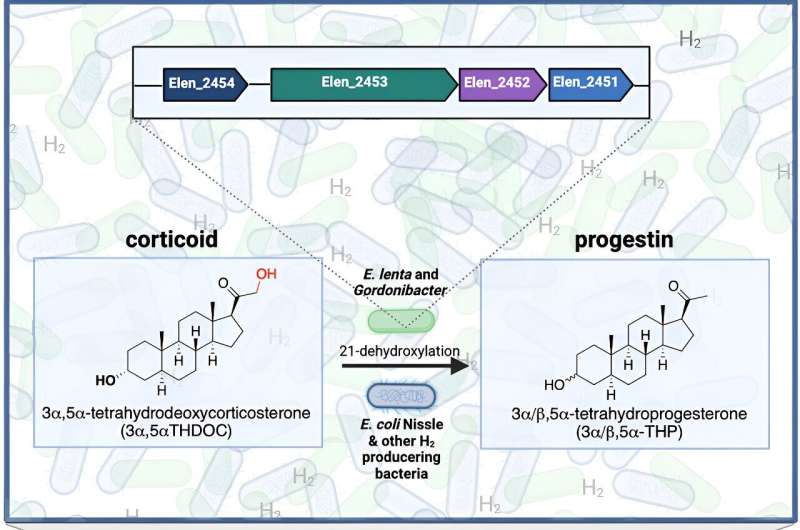This article has been reviewed according to Science X's editorial process and policies. Editors have highlighted the following attributes while ensuring the content's credibility:
fact-checked
peer-reviewed publication
trusted source
proofread
Study demonstrates how gut microbes process steroids—using flatulence

It turns out flatulence can serve a purpose beyond being uncomfortable or funny: Gas released by some gut bacteria stimulates other gut bacteria to produce a hormone involved in pregnancy and in an FDA-approved treatment for postpartum depression, according to new research led by Harvard Medical School scientists.
The work shows how gut bacteria can produce new hormones from steroids in bile and, in doing so, act like an endocrine organ. This research adds to the growing list of ways gut microbiota may influence human biology and health. The study also provides new evidence that doctors could one day treat or prevent certain kinds of mental health conditions by manipulating the gut microbiome.
The findings were published May 24 in Cell.
"While it's common knowledge that gut health is important to our overall well-being, exactly how bacteria that reside in our GI tract interact with one another and with our own cells to impact our mental health is still being uncovered," said first author Megan McCurry, who conducted the work as a graduate student and postdoctoral research fellow in the lab of Sloan Devlin in the Blavatnik Institute at HMS.
"This work reveals how certain gut bacteria perform a chemical transformation that produces a steroid that could impact women's health and postpartum depression."
Bugs making drugs
Working in lab dishes and with mice, McCurry and colleagues found two related kinds of bacteria in the human gastrointestinal tract—Gordonibacter pamelaeae and Eggerthella lenta—that can modify steroids. They further found that this chemical modification occurs in the opposite direction from how human cells make steroids.
"Our cells make steroids only in the oxidative direction, that is, losing electrons, whereas we've shown that gut bacteria can go in the reverse direction, known as reduction, or gaining electrons—making the bacterial transformation unique," said Devlin.
The team found that the bacteria can alter corticoids found in bile—steroids that play roles in immune function and metabolism. The bacteria turn them into progesterone derivatives, which are sex hormones and neurosteroids that affect the brain and nervous system.
"We know that the human body makes progesterone in the adrenal glands, placenta, and ovaries. Our work suggests that the microbiome acts as an additional endocrine organ," said Devlin, HMS associate professor of biological chemistry and molecular pharmacology and senior author of the study.
Devlin and team found that one of the progesterone derivatives that gut bacteria produce is allopregnanolone, so named a century ago because the body makes it during pregnancy.
In partnership with Andrea Edlow, HMS associate professor of obstetrics, gynecology, and reproductive biology at Massachusetts General Hospital, the team investigated allopregnanolone production in pregnancy.
Analyzing the fecal samples of study participants revealed that women in their third trimester of pregnancy not only had 100 times higher levels of allopregnanolone but also had more genetic traces of the two gut bacteria than people who were not pregnant. The findings suggest that gut bacteria contribute to allopregnanolone production during pregnancy.
Researchers have linked low levels of allopregnanolone to postpartum depression and other mood and psychiatric disorders, and allopregnanolone is used as an FDA-approved drug known as brexanolone to treat postpartum depression.
With that in mind, Devlin and colleagues want to expand their fecal sample study to track participants across the first, second, and third trimesters and after delivery and see who develops postpartum depression.
The goal is to better understand whether gut bacteria contribute to allopregnanolone levels throughout pregnancy and drive risk for or protect against postpartum depression.
If the researchers find an effect, "down the road, as a community, we could think about microbiome-targeted therapies for neurological conditions like depression," said Devlin.
Behind the chemistry
The researchers also revealed how the two bacteria do their chemical transformations.
First, they identified the genes at work. Second, they found that the G. pamelaeae and E. lenta bacteria need hydrogen—one of the gases other bacteria in our GI tract produce as they digest food.
"The effects of gas on bacterial metabolism have been largely overlooked, likely because studying it in the lab is very difficult," she said. "Our work suggests that there are likely to be other gut bacterial processes that are significantly affected by, basically, flatulence."
The team hopes the work demonstrates that the chemistry conducted by gut bacteria has an impact on human health and behavior, in this case during pregnancy.
"Prior to our work, the prevailing understanding was that the host makes steroids; the microbiome was not a part of the conversation," said Devlin. "We hope this work convinces people that gut bacteria modify steroids to produce molecules that can affect host functions, including mood and behavior."
More information: Megan D. McCurry et al, Gut bacteria convert glucocorticoids into progestins in the presence of hydrogen gas, Cell (2024). DOI: 10.1016/j.cell.2024.05.005



















